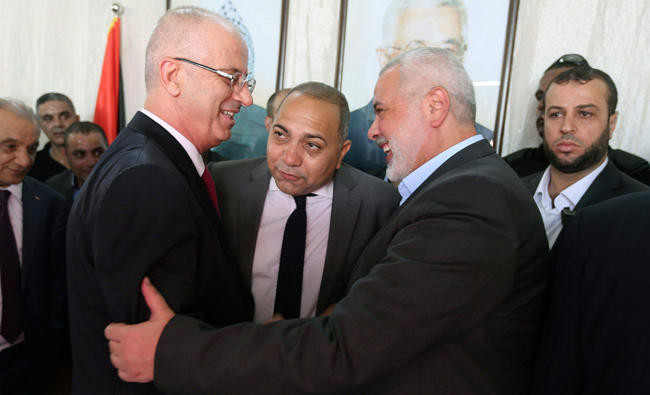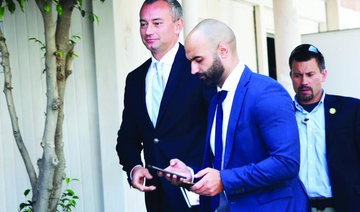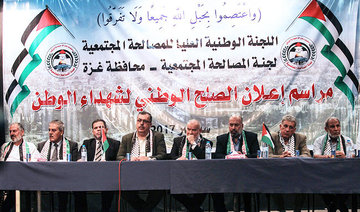GAZA CITY/AMMAN: Palestinians took a giant step toward national reconciliation on Monday when Prime Minister Rami Hamdallah and other officials from the Fatah-led Palestinian Authority in Ramallah arrived in the Hamas-run Gaza Strip.
Thousands of Gazans received the delegation warmly, hoping this would finally lead to an end to the 11-year division between Hamas and the Palestinian Authority. Hamdallah described the visit as a “historic moment” toward unity of the Palestinian people.
“We came on the orders of Palestinian President Mahmoud Abbas to announce to the world, from the heart of Gaza, that the Palestinian state cannot be without political and geographic unity between the West Bank and Gaza,” Hamadallah said.
“We know that the only way to achieve our goals is through unity, and to protect the Palestinian political system.”
He said the national unity government would now start to assume its administrative responsibility for the Strip.
The visit is Hamdallah’s first to Gaza in two years. He told journalists he was emotionally moved by the situation in Gaza because of the decade-long siege and the internal split.
An Egyptian security delegation led by the Egyptian ambassador to Israel, Hazem Khairat, will be monitoring the reconciliation process. Egypt, represented by President Abdel Fattah El-Sisi, was the sponsor of reconciliation talks in Cairo over the past few weeks.
After a Hamas delegation met Egyptian diplomats, the movement decided to dissolve its administrative committee and expressed its willingness to reconcile with its rival, the Fatah political party.
The UN Special Coordinator for the Middle East Peace Process, the Bulgarian politician Nickolay Mladenov, said that the Cairo agreements represented the last chance for Palestinian reconciliation.
“This opportunity must be well used,” he said during a visit to the Gaza Strip on Monday.
Fahmi Shurab, a professor of international relations at Al-Aqsa University in Gaza, told Arab News: “The reconciliation train has left the station and there is no stopping it because there is a consensus of opinion that both sides need each other and neither can negate the other.”
Everyone in Gaza was awaiting the reversal of a number of decisions made recently by the Ramallah leadership that led to a reduction in daily supplies of electricity, Shurab. “What is needed is for the Palestinian Authority to work on increasing the number of hours of electricity, to unite employees, and to resolve the border disputes.”
The electricity issue is a top priority for Nehad Mughni, the head of engineering and planning at the Gaza Municipality. “Electricity is crucial to help us pump water and treat sewage,” he told Arab News. A meeting late on Monday discussed the crucial issues of electricity, border crossings and the merger of public-service employees.
Many reconstruction projects in Gaza had been delayed because of Israel’s refusal to admit some technical items, Mughni said. “We are hoping that with reconciliation moving ahead, Israel will ease some of the restrictions it has placed on the entry of necessary reconstruction materials.” Mughni said that four wells that would alleviate water shortages in Gaza had not been completed because Israel has held up necessary technical and mechanical instruments, even though the German government was funding the projects.
Jad Isaac, the director of the Applied Research Institute Jerusalem, told Arab News that the Fatah-Hamas split had ended because both sides realized they had failed. “Both Fatah and Hamas have reached the conclusion that reconciliation is beneficial to both,” he said.
“The new leadership in Hamas is pragmatic, and realizes that they have to do something after they failed to meet the needs of Gazans. On the other hand, Fatah realized they have to do something before Dahlan strikes a deal with Hamas.” Mohammed Dahlan is the former Fatah leader in Gaza, whose return from the West Bank has long been rumored.
Mustafa Barghouti, head of the Palestinian Initiative Movement, said the ballot box was the key to the success of the reconciliation. “A mandate by the people through elections will be the best way to resolve any problem,” he told the BBC Arabic service.
Hamas has been the de-facto ruler of the Gaza Strip since 2007, after the party defeated President Mahmoud Abbas’s long-dominant Fatah party in parliamentary elections. Street battles between the two factions left many dead, and ended with Hamas ousting Abbas’s forces and taking over Gaza.
Hamas’s control over security and its nature as an armed resistance movement have also been an obstacle for the PA, which cooperates with Israel on security-related matters, as laid out in the Oslo Accords, signed in 1993 and 1995 between the Palestine Liberation Organization and Israel.
However, this is not the first time the two parties have attempted reconciliation; two previous agreements collapsed amid conflicts between the two parties.
However, many people are more optimistic this time because of the concrete steps the two parties are taking to finally achieve it.
Palestinian PM in Gaza for major reconciliation effort
Palestinian PM in Gaza for major reconciliation effort

Israeli FM: ‘No justification’ for ICC to take steps against Israeli leaders

Saar told Reuters Israel has appealed the decision and that it sets a dangerous precedent.
The foreign minister also said Israel would finish the war in Gaza when it “achieves its objectives” of returning hostages being held by Hamas in Gaza and ensuring the Iranian-backed group no longer controls the strip. Saar said Israel does not intend to control civilian life in Gaza and that he believes peace is “inevitable” but can’t be based on “illusions.”
Pope Francis set to visit Turkiye for Council of Nicaea anniversary in 2025

- The pope had already expressed in June the desire to go on the trip despite international travel becoming increasingly difficult for him
ROME: Pope Francis said on Thursday he planned to visit Turkiye’s Iznik next year for the anniversary of the first council of the Christian Church, Italian news agency ANSA reported.
The early centuries of Christianity were marked by debate about how Jesus could be both God and man, and the Church decided on the issue at the First Council of Nicaea in 325.
“During the Holy Year, we will also have the opportunity to celebrate the 1700th anniversary of the first great Ecumenical Council, that of Nicaea. I plan to go there,” the pontiff was quoted as saying at a theological committee event.
The city, now known as Iznik, is in western Anatolia, some 150km southeast of Istanbul.
The pope had already expressed in June the desire to go on the trip and the spiritual head of the world’s Orthodox Christians, Ecumenical Patriarch Bartholomew, had said the two men would celebrate the important recurrence together but no official confirmation had been made yet.
Despite international travel becoming increasingly difficult for him because of health issues, Francis, who will turn 88 on Dec. 17, completed in September a 12-day tour across Asia, the longest of his 11-year papacy.
Israel wants India’s Adani Group to continue investments after US bribery allegations

- Adani Group holds a 70 percent stake in Haifa port in northern Israel and is involved in multiple other projects with firms in the country
- US last week accused Adani Group of being part of scheme to pay bribes of $265 million to secure contracts, misleading US investors
HYDERABAD, India: Israel wants India’s Adani Group to continue to invest in the country, Israel’s envoy to India said on Thursday, affirming the nation’s support for the ports-to-media conglomerate whose billionaire founder is facing bribery allegations in the United States.
“We wish Adani and all Indian companies continue to invest in Israel,” Ambassador Reuven Azar said in an interview with Reuters, adding that allegations by US authorities were “not something that’s problematic” from Israel’s point of view.
The Adani Group holds a 70% stake in Haifa port in northern Israel and is involved in multiple other projects with firms in the country, including to produce military drones and plans for the manufacture of commercial semiconductors.
US authorities last week accused Gautam Adani, his nephew, and Adani Green’s managing director of being part of a scheme to pay bribes of $265 million to secure Indian power supply contracts and misleading US investors during fund raising efforts there.
Adani Group has denied all the accusations, calling them “baseless.”
Still, shares and bonds of Adani companies were hammered last week and some partners began to review joint projects.
“I am sure Adani Group will resolve its problems,” Azar said on the sidelines of an event in the southern city of Hyderabad.
Lebanon to hold parliament session on Jan. 9 to elect president

- State news agency: ‘Speaker Nabih Berri called a parliament session to elect a president of the republic on January 9’
BEIRUT: Lebanon’s parliament will hold a session in January to elect a new president, official media reported on Thursday, a day after an Israel-Hezbollah ceasefire began and following more than two years of presidential vacuum.
“Speaker Nabih Berri called a parliament session to elect a president of the republic on January 9,” the official National News Agency reported.
Israel says ceasefire with Hezbollah in Lebanon violated

- Lebanese security sources and state media report tank fire struck Markaba, Wazzani and Kfarchouba
- Lebanon’s military deployed troops and tanks across the country’s south on Thursday
BEIRUT: Israel’s military announced on Thursday that it had detected the presence of suspects in several areas of southern Lebanon, calling it a violation of the ceasefire with Hezbollah.
At least two people were wounded by Israeli fire in southern Lebanon, state media reported.
Earlier on Thursday Israeli tank fire targeted three towns along Lebanon’s southeastern border with Israel, according to Lebanese security sources and state media. The strikes came a day after the ceasefire, which prohibits “offensive military operations,” had officially taken effect.
The tank fire hit Markaba, Wazzani, and Kfarchouba, all located within two kilometers of the Blue Line that marks the border between Lebanon and Israel. One security source reported that two people were wounded in Markaba.
A ceasefire between Israel and Lebanese armed group Hezbollah took effect on Wednesday under a deal brokered by the US and France, intended to allow people in both countries to start returning to homes in border areas shattered by 14 months of fighting.
But managing the returns have been complicated. Israeli troops remain stationed within Lebanese territory in towns along the border, and on Thursday morning the Israeli military urged residents of towns along the border strip not to return yet for their own safety.
The three towns hit on Thursday morning lie within that strip.
There was no immediate comment on the tank rounds from Hezbollah or Israel, who had been fighting for over a year in parallel with the Gaza war.
Lebanon’s military deployed troops and tanks across the country’s south on Thursday as a ceasefire in the Israel-Hezbollah war largely held for a second day.
A Lebanese army source said its forces were “conducting patrols and setting up checkpoints” south of the Litani River without advancing into areas where Israeli forces were still present.
In the border village of Qlaaya, residents threw rice and flowers to celebrate the arrival of Lebanese soldiers.
“We only want the Lebanese army,” chanted the residents of the Christian-majority village, as they clapped and cheered for the troops and waved the Lebanese red, white and green flag.
Since the ceasefire took effect on Wednesday, tens of thousands of Lebanese who fled their homes have headed back to their towns and villages, only to find scenes of devastation.
“Despite all the destruction and the sorrow, we are happy to be back,” said Umm Mohammed Bzeih, a widow who fled with her four children from the southern village of Zibqin two months ago.
“I feel as if our souls have returned,” she said, visibly exhausted as she swept up the shattered glass and pieces of stones that carpeted the floor.
Hezbollah lawmaker Hassan Fadlallah said his group was cooperating on the army’s deployment in the south.
There is “full cooperation” with the Lebanese state in strengthening the army’s deployment, he said, adding the group had “no visible weapons or bases” but “nobody can make residents leave their villages.”
The agreement, a rare diplomatic feat in a region racked by conflict, ended the deadliest confrontation between Israel and the Iran-backed militant group in years. But Israel is still fighting its other arch foe, the Palestinian militant group Hamas, in the Gaza Strip.
Under the ceasefire terms, Israeli forces can take up to 60 days to withdraw from southern Lebanon. Israeli Prime Minister Benjamin Netanyahu said he had instructed the military not to allow residents back to villages near the border.
Lebanon’s speaker of parliament Nabih Berri, the top interlocutor for Lebanon in negotiating the deal, had said on Wednesday that residents could return home.


















